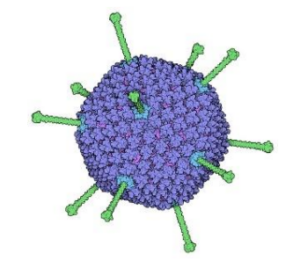
General Information
Adenoviruses are the largest (90-100 nm) non-enveloped viruses and have DNA. More than 50 types of immunologically distinct adenoviruses can cause infections in humans. Adenoviruses are relatively resistant to common disinfectants (such as alcohols) and can be detected on surfaces such as doorknobs, objects, and water of swimming pools and small lakes. Adenoviruses most commonly cause respiratory illness.
People with weakened immune systems are at high risk for developing severe illness caused by adenovirus infection. Also, adenoviruses have historically been a common cause of acute respiratory illness in military recruits, although the frequency has significantly decreased since the reinstitution in March 2011 of the
adenovirus vaccine administration.
Some people infected with adenoviruses, especially those who have weakened immune systems, can have ongoing infections in their tonsils, adenoids, and intestines that do not cause symptoms. They can shed the virus for weeks or longer.
Symptoms
Adenoviruses can cause a wide range of illnesses such as:
- Common cold
- Sore throat
- Bronchitis (a condition that occurs when the airways in the lungs become filled with mucus and may spasm, which causes a person to cough and have shortness of breath)
- Pneumonia (infection of the lungs)
- Diarrhea
- Pink eye (conjunctivitis)
- Fever
- Bladder inflammation or infection
- Inflammation of stomach and intestines
- Neurologic disease (conditions that affect the brain and spinal cord)
- Hepatitis (Rare)
Adenoviruses can cause mild to severe illness, though serious illness is less common. People with weakened immune systems, or existing respiratory or cardiac disease, are at higher risk of developing severe illness from an adenovirus infection.
Transmission
Adenoviruses are usually spread from an infected person to others through close personal contact, such as touching or shaking hands; the air by coughing and sneezing; touching an object or surface with adenoviruses on it, then touching your mouth, nose, or eyes before washing your hands. There is also a recent study stating the washing hands may be more effective against transmission, versus the use of alcohol based hand rubs (Uzuner H, et al. Investigation of the efficacy of alcohol-based solutions on adenovirus serotypes 8, 19, and 37, common causes of epidemic keratoconjunctivitis, after an adenovirus outbreak in hospital. J Hosp Infect 2018;100(3):E30-36
Some adenoviruses can spread through an infected person’s feces, for example, during diaper changing, or active diarrhea. Adenovirus can also spread through water, such as swimming pools, but this is less common.
Treatment
There is no specific treatment for people with adenovirus infection. Most adenovirus infections are mild and don’t require any medical care; clinical care of adenovirus infections includes supportive management of symptoms and complications. Cidofovir has been used to treat severe adenovirus infections in people with immunocompromised systems in specific situations.
Prevention
Adenoviruses are resistant to many common disinfectants and can remain infectious for long periods on environmental surfaces and medical equipment. To prevent healthcare-associated outbreaks of adenovirus infections, such as epidemic keratoconjunctivitis, healthcare providers should strictly follow infection control practices, including contact / droplet precautions, and promptly respond to and report clusters of cases. If an outbreak occurs the facility should consider assessing the alcohol hand sanitizer in use and/or change to soap and water.
Guidelines & Recommendations
Additional information is available at https://www.cdc.gov/adenovirus/.
Cleaning and Disinfection
Diligent environmental cleaning and disinfection and safe handling of potentially contaminated materials is essential. The following Diversey disinfectants have been tested and shown to be efficacious against strains of Adenovirus, as well as several other non-enveloped viruses when used in accordance with label instructions:

In the US, the AHP products would be effective for new strains of Adenovirus that have not been tested. The EPA’s Emerging Viral Pathogen document states, “A product should be approved by EPA to inactivate at least one small, non-enveloped virus to be eligible for use against a large, non-enveloped emerging viral pathogen.”

